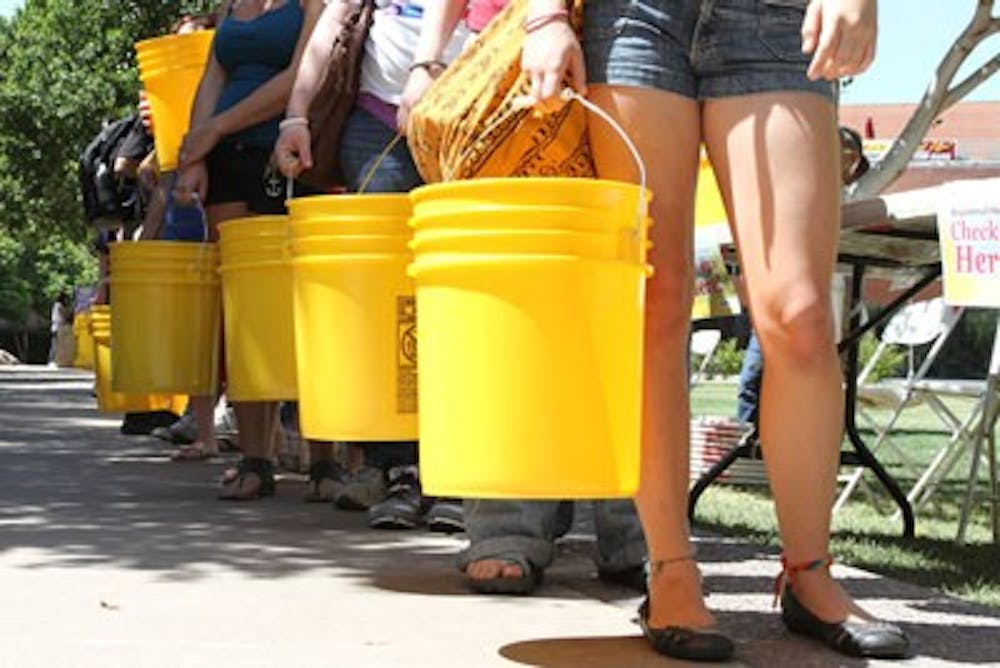About 35 students walked across the Tempe campus with five gallons of water on their heads Tuesday morning to raise awareness about young women in rural African villages who spend hours every day fetching water for their families.
The event, called “Be Hope to Her,” was one of 22 hosted nationwide by Nuru International, a humanitarian organization working to eradicate poverty in a sustainable way.
“This event is geared toward inspiring people of our generation to work to end extreme poverty,” Nuru grassroots movement director Billy Williams said. “We believe through this event people will be transformed.”
The need for women to spend so much time fetching water in this manner leads to other problems that turn into a cycle of poverty — a cycle Nuru is trying to break.
Because girls as young as 6 must spend hours getting water, they can’t attend school, which means they lack the education to pull themselves out of poverty later in life, Williams explained to students at the event.
“It’s really sad that these girls don’t get to go to school,” said local high school student Courtney Besaw, who was attending the event with her mother, Christine Besaw.
“If I had to miss school to do this, I would cry myself to sleep every night,” said Christine Besaw, a women and gender studies senior.
The walk began with empty buckets at the Student Services building on the southwestern corner of campus, and participants traveled north on Palm Walk to University Drive, then west to the Global Institute of Sustainability.
There, students filled their yellow buckets with five gallons of water, weighing roughly 40 pounds, and returned to Student Services, carrying the buckets on their heads.
The entire route was roughly one mile.
Biology junior Elizabeth Boehler, who participated in the walk, said she had to stop more than once, and on one occasion she dumped out some water in order to finish.
“This was a really, really humbling experience, and incredibly painful, to be honest,” she said. “It helped me see a little bit more what these girls are going through. I can’t imagine doing it for 16 hours a day.” Williams said this is the exact emotion organizers hope to create through the event.
“It’s one thing to hear a statistic about the millions of women who are walking miles a day to get water for their families,” he said. “It’s another altogether to walk with a bucket to gather water. It changes you. People go from hearing a statistic to wanting to do something about the issue.”
By participating in Be Hope to Her, each student was already benefiting Nuru’s cause, ASU coordinator Brian Laesch said.
The registration fee of $8 covered the minimal cost of the event, and the rest goes directly to Nuru.
An anonymous donor provided the registration fee for the first 200 participants, meaning the event raised even more money than it would have solely from the participants, Laesch said.
In addition to the walk, several large posters designed to raise awareness of U.S. water consumption were set up near Student Services.
Participants were asked to fill in one icon for each time in a day that they shower, wash their hands, flush a toilet or drink a bottle of water.
“On average, each of us consume 80 to 100 gallons of water each day,” Laesch said. “Think about what it would be like to get that amount of water in a bucket and carry it back home.”
With more than 100 gallons of water carried back “home” to Student Services, students watered plants and grass in the area in order to use the water in an environmentally friendly way.
Participants were also provided with materials to decorate their buckets, which they were allowed to keep.
“It’s a really neat thing to have and remember the event by,” ASU coordinator Cate Marshall said.
After finishing the walk, several students said they had a newfound appreciation for how difficult living with no nearby water source would be.
Global health freshman Dawn Cole said every student should experience something this moving.
“This should be a requirement for a class or something that everyone has to do, because you have no idea what it’s really like,” she said as she carried her bucket. “I can’t believe little kids are doing this.”
Reach the reporter at keshoult@asu.edu





